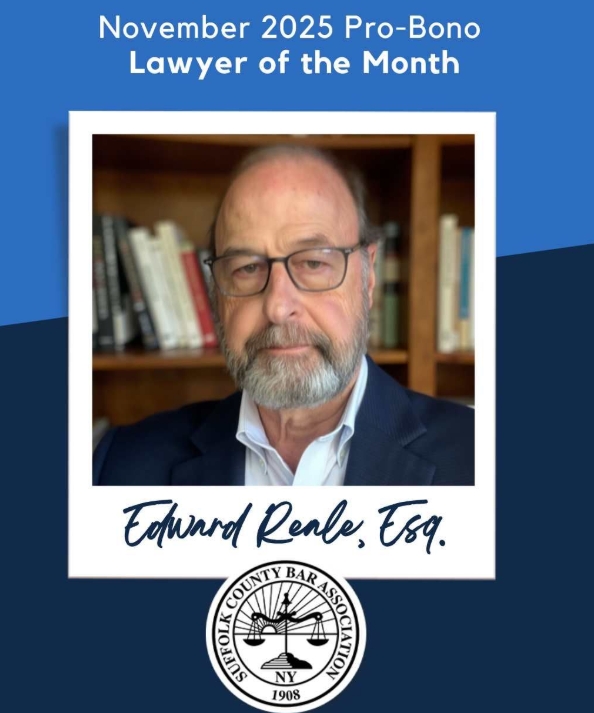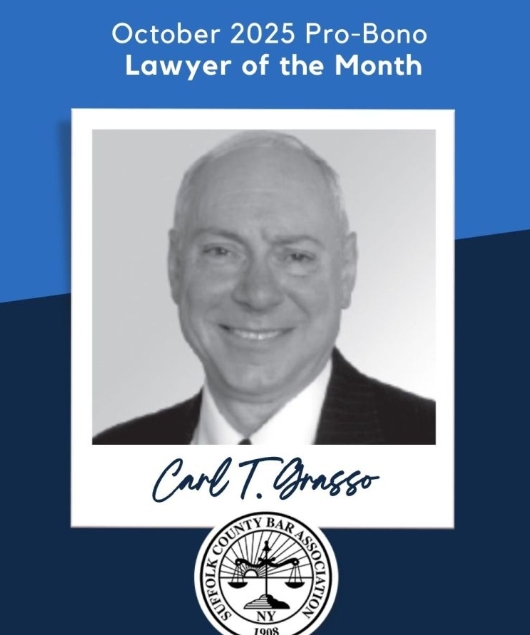
Fall Harvest 2015
December 24, 2015
Leif Rubinstein, Esq.
January 30, 2016The Suffolk Pro Bono Project takes great pleasure in recognizing the Bankruptcy and Advanced Bankruptcy Clinics at Touro Law Center and their Clinical Director, Leif Rubinstein as the Pro Bono Attorney of the Month. With Professor Rubinstein at the helm, Touro’s bankruptcy clinics have been working hand-in-hand with the Pro Bono Project for over seven years, helping hundreds of low income clients overwhelmed with debt, obtain legal assistance.
The Project at Nassau Suffolk Law Services and Touro’s bankruptcy clinics have had a long-standing, integral relationship with each other. The Project is a major referral source for the clinic, providing approximately 75% of their students’ clients. Before referring a pro bono client, the Project screens applicants for financial and substantive eligibility and assembles the essential documentation. The clinic students often participate in the final phases of the Project’s screening by interviewing prospective clients at the Nassau Suffolk Law Services office. The clinics, in turn, provide a vital benefit to the Project by accepting a substantial portion of its pro bono referrals.
Professor Rubinstein has seen some changing trends among the clients served by the Project and his clinics. He recalls that the cases from several years ago typically involved debt accumulated due to over-spending on non-essentials. He finds that today’s Project client, in contrast, typically has been overwhelmed by loss of employment, or by medical debt from a prolonged illness or serious injury. Many such clients have turned to using credit cards, out of desperation, to pay for their essentials. Professor Rubinstein sees another new trend which he finds quite concerning– the higher prevalence of young debtors (clients in their 20s and 30s) saddled with substantial debt. He believes the Project and his clinics provide a crucial service when helping eligible clients obtain debt relief, noting that the clients, because of lack of resources, “truly have nowhere else to go.” He adds, “By extinguishing their debt, we set a person’s mind at ease so they can start addressing the other pressing issues in their lives.”
Professor Rubinstein has been practicing bankruptcy law for his entire legal career. A graduate of Hofstra Law School (class of 1978), he initially worked in private practice for 30 years, before coming to Touro in 2009. In that year he founded Touro’s Mortgage Foreclosure and Bankruptcy Clinic to represent clients in Chapter 7 bankruptcy proceedings. He then created and became director of the Advanced Bankruptcy Clinic in 2010. In 2015, Professor Rubinstein became Touro’s Director of Clinical Programs, overseeing all twelve of the law school’s legal clinics, which include Touro’s Disaster Relief Clinic, the Veterans’ and Servicemembers’ Rights Clinic, the Mortgage Foreclosure Clinic, the Elder Law Clinic, and the Immigration Law Clinic. In addition to his association with the Project through the clinics, he has served on the Suffolk County Bar Association Pro Bono Foundation Board for over 20 years.
Bankruptcy Clinic students (2Ls and 3Ls) are each assigned clients and handle virtually all aspects of the case, with direct supervision from Professor Rubinstein. Students conduct the initial client interviews, help the client gather necessary financial information, conduct research, prepare the bankruptcy petition, and prepare the necessary motions. They attend, but do not conduct, the Section 341 hearing before the Bankruptcy Court Trustee. Law students participating in the Advanced Bankruptcy Clinic (3Ls in their spring semester), take on the more complex Chapter 7 matters, such as those involving the discharge of student loan debt, lien removals, and adversarial proceedings and also work with Chapter 13 debt restructuring cases.
Student participation in clinics has long been emphasized at Touro Law Center. In the Fall of 2014, Touro made clinic participation a graduation requirement. Students must provide 12 hours per week of fieldwork and participate in a three hour seminar. Professor Rubinstein believes his bankruptcy clinic students benefit greatly from their experience, given that they are working in a law office-like environment and interacting directly with clients in all phases of the case. Many have gone on to consumer debt legal practices, either as attorneys for the petitioners or representing creditors. After all his years directing the clinics, he still enjoys witnessing his students’ evolution as they start developing their legal skills. “It’s great to see the light bulb turn on in their heads” he notes, “when they’re at a point in the semester when it all starts coming together for them.”
Maria Dosso, Director of Communications and Volunteer Services at Nassau Suffolk Law Services applauds Touro Clinic’s outstanding contribution and added, “We are very fortunate to have such a strong working relationship with Professor Rubinstein whose professionalism and generous spirit serve as a model to his students.”
The Pro Bono Project is proud of its long association with the Touro Law Center’s bankruptcy clinics and is very grateful for the assistance the students and Leif Rubenstein have provided to so many of our pro bono clients. We look forward to continuing to work together in our joint mission of providing quality free legal services to those in our community in extreme financial distress. It is with great pleasure that we honor them again as the Pro Bono Attorney of the Month.
The Suffolk Pro Bono Project is a joint effort of Nassau Suffolk Law Services, the Suffolk County Bar Association and the Suffolk County Pro Bono Foundation, who, for many years, have joined resources toward the goal of providing free legal assistance to Suffolk County residents who are dealing with economic hardship. Nassau Suffolk Law Services is a non-profit civil legal services agency, providing free legal assistance to Long Islanders, primarily in the areas of benefits advocacy, homelessness prevention (foreclosure and eviction defense), access to health care, and services to special populations such as domestic violence victims, disabled, and adult home resident. The provision of free services is prioritized based on financial need and funding is often inadequate in these areas. Furthermore, there is no funding for the general provision of matrimonial or bankruptcy representation, therefore the demand for pro bono assistance is the greatest in these areas. If you would like to volunteer, please contact Ellen Krakow, Esq. 631 232-2400 x 3323.




